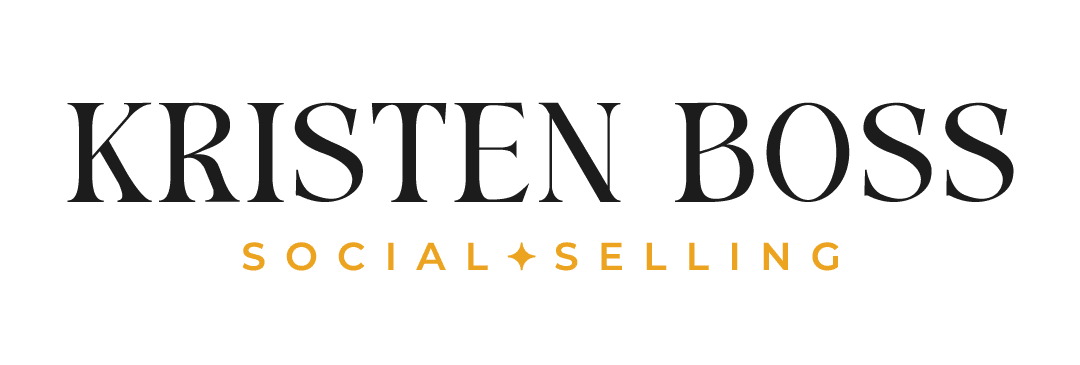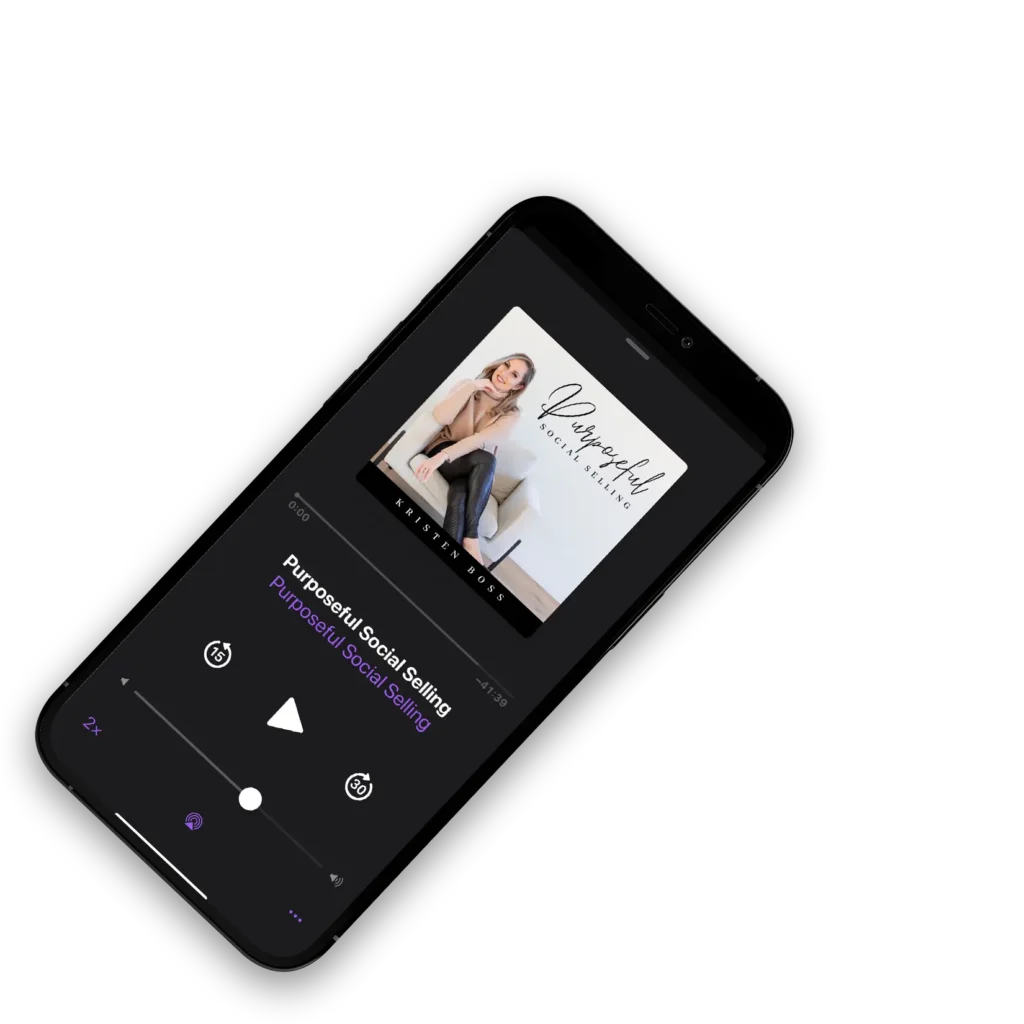We’ve all dreamt of a time when we get to call the shots and have the freedom that only comes with running our own successful business. But what happens when you try to turn that dream into a reality? The logistics alone can leave you frustrated before you’ve even created your first vision board. And don’t even get started on finding the right time to leave your 9-5.
If these are the types of thoughts that keep you up at night, then we have just the thing. Kristen welcomes online marketing expert, digital media guru, and fellow author, Amy Porterfield, to talk about her new book Two Weeks Notice. In her new book, Amy speaks about finding the courage to quit your job, make more money, work where you want, and change the world.
Here are a few highlights from their conversation:
- Addressing the resentment towards your 9-5 while looking for an escape route
- How to know when you’re ready to leave
- Explanation of the “Un-bossing Yourself” concept
- The importance of guarding your dreams
- How to find your sweet spot for creating a business
Moving on to the next thing is a scary time, but it doesn’t have to be. You can create the life you love without the hustle. And in this economy, there couldn’t be a better time to spread your wings. After all, you never know where it will lead you until you get started.
Amy’s new book, Two Weeks Notice, will hit the shelves on February 21st. If you’d like to pre-order, be sure to check out www.twoweeksnoticebook.com, where she offers bonus materials to complement the book and help you turn your dream into a reality.
Don’t miss out on the in-person social selling event of the year! Announcing the Rising Leader Summit, April 14-15, 2023, in Denver, CO. The LIVE EVENT that has historically been exclusive to 6-7 figure earners is now AVAILABLE to anyone who is hungry and willing and desires to step into higher levels of leadership. Go to kristenboss.com/rise to register today.
Thanks for listening! Do you have a question about network marketing? Kristen can help! Drop your question here, and she just might answer it live on the podcast: https:/Kristenboss.com/question
Connect with Kristen:
If you’re ready to learn the simple process of running your social selling business online, you have to check out Kristen’s live group coaching program! The Social Selling Academy: www.thesocialsellingacademy.com
Transcript for Episode #150 Two Weeks Notice with Amy Porterfield:
Kristen Boss (00:03): You’re listening to the Kristen Boss Podcast. I’m your host, Kristen Boss. As a bestselling author and performance coach, I’m on a mission to share about sustainable and purposeful approaches to both business and life. Each week, I bring relevant topics that I believe are necessary to create a life of purpose, significance and meaning. Entrepreneurship is about so much more than growing your bottom line. It’s about who you are becoming in the process and building a life that is truly extraordinary. Entrepreneurship is really just the beginning.
Kristen Boss (00:57): Hey, bosses. Welcome to another episode of the show. Okay. This episode feels like a deeply full circle moment. Amy doesn’t know this yet, but the person I’m introducing to you is like the OG of the social media world and Side Hustle World and all of those things. And I have been a fan of this person for a long time, and I have the Amy Porterfield. I feel like you don’t need an introduction, but I’m going to introduce you anyway. So I have the Amy Porterfield on my podcast to talk about her newest book, two weeks notice, which is just the cutest and best title ever and so relevant <laugh>. Amy, I’m so glad you’re here.
Amy Porterfield (01:37): Well, thank you so much. And you teased me with a story before we went on. Yeah, I love to hear it.
Kristen Boss (01:44): Okay. It’s perfect because it segues into your book book so perfectly. Okay, so your book is all about people getting ready to leave the nine to five start their side hustle. And I found you in 20 20 18, and I was a hair stylist working and I was like, I cannot be behind a chair anymore. I’m only making money when I’m doing hair, and I know there’s something out there for me. And I found your podcast, and then I found I saw you cross on an ad, and you were the first ever course I purchased. And it was your list. It was your List Builders course. I, yeah. I spent birthday money on that, Amy. I was like so tight with money at the time, but I’m like, I need this. I did your free webinar. And I was like, that’s it. And I lit, literally scraped up the cash, put birthday money into the list builders, and it literally changed the trajectory of my entire career. So I feel like I’m having a moment where, I don’t know if you follow sports much, but I can’t remember who it was, but it was a football game with Tom Brady, and it was one of the quarterbacks who had been following Tom Brady for the longest time. And he’s like, I am on the field with my hero. So I’m like, I’m on field with my hero.
Amy Porterfield (02:57): Well, I mean, I’m in good. I told you even before we started to record, I love everything that you’re doing. I feel like you’re on fire. It’s really exciting to watch. So if I was a little tiny piece of that, I am honored.
Kristen Boss (03:09): Oh, you were a piece of that. And I’m so excited to share this with my audience because my audience, they have the dream. They are just, they’re like, there’s more than me being at this nine to five working for somebody else. And I think the timing of your book is so perfect, Amy, just because we are, we’re in a recession and people are looking at, there have got to be other options. Yes. Maybe the nine to five doesn’t feel as safe anymore with all the layoffs. And I think on the heels of now we’re in a post pandemic world, I do think Covid really caused everyone to reevaluate, is this actually what I want Amazing out of my life. So your book is so timely, and I’m so excited for you. Tell my audience a little bit about why you wrote this book. I mean, you’ve been doing this for 10 years. Yes. You, you’ve been doing this a while.
Amy Porterfield (03:59): Yes. I’ve been in the game for a long time, and I thought about writing a book for a while. I think most entrepreneurs think about what would it be like if I wrote a book one day then, but I just didn’t know where I wanted to go with it. And then a light bulb moment came on where I thought when I first started, I left my last nine to five job actually almost 14 years ago. So this has been a while. And I remember when I left, I had no clue what I was doing. First of all, the transition from nine to five into being an online business owner, I couldn’t even say entrepreneur. It was too fancy for me. So just to have my own business, that whole transition was really rough. And then actually going out on my own, what do I do? Where do I start? What steps do I take? I had no clue. So I wrote the guidebook that I wish I had when I was first starting out.
Kristen Boss (04:49): And so many people, I feel like they get excited about the dream, but the starting feels so hard, and I feel like you have built this into your book. Okay, so how do I start, right? Yeah,
Amy Porterfield (05:03): Exactly. It’s a question that comes up for so many people. How do I even start? And for those that are listening that are still in a nine to five job, that question really starts then how do I even get this business going while I’m still in my nine to five job? So in my book, two weeks notice, I teach people how to create a runway. A runway. So what it looks like from the day they decide I’m going to leave this job to the day they actually walk out for the very last time, there’s this runway to help them get ready for starting their own business, different things you need to do. And then when you get out there, it’s like, wh where do I start? What do I do? I want to make sure that people know there is a step-by-step process you can take from website building to content creation, to putting together your offer, to finding people to be on your email list. All of that is there’s a plan for that. And so that’s what I kind of outlined throughout the pages.
Kristen Boss (05:57): That’s so good. And I feel like people, I can do you, you talk about this in your book where you’re talking about how do you prevent people from being in this place where they know they want to leave their nine to five, but they’re not stuck in this horrible, yes, I hate where I’m at resentful place and this, but once they get there, it’s going to be better. There’s a really delicate tension I think that needs to happen when someone’s trying to leave the nine to five, but not being in a place where they are miserable, resentful, hating the nine to five while they’re trying to look for the escape route. So you talk about developing an exit strategy. Yeah. Talk a little bit more about that.
Amy Porterfield (06:35): I love that you asked this question because I call that golden handcuffs when your job is not great, but not bad. You’re getting paid. Well, and for me, I worked for Tony Robbins, I got a great paycheck. I traveled the world and got to work on the events that he does. I had a good job, but I wasn’t free. I had hit that glass ceiling. There were things about it that weren’t working for me, but at the end of the day on paper, it looked great. So I think golden handcuffs makes it even worse, versus I know I’m underpaid, I’m undervalued. I hate this job. I’m out. That gives you a sense of urgency. So what do you do? How do you put together this exit plan? Well, the first thing you need to do is choose your exit date. Now, when people ask me, how do I know when I should quit?
Amy Porterfield (07:22): Well, I usually say three months, six months, nine months or a year, anything over a year, you’re letting fear fully take over, and you’re probably never going to leave. So you need to choose your timeline and to choose your timeline. You’re starting to think about what do I want to do from now until the day I leave? So for me, yes, my timeline was six months in that time. I wanted to start a side hustle. I wanted to get clear about my finances, how much money do I really need to make each month to pay the bills? And I also wanted to kind of fuel my brain with some extra knowledge. I really believe that we all have it in us to start a business today. You don’t need extra certification, you don’t need more time. You’ve got skills and results that you can rely on to start a business, but it doesn’t hurt to read the books and listen to the podcast and maybe buy that digital course.
Amy Porterfield (08:07): I bought a digital course on video marketing. I wanted to learn about that before I left my nine to five job. So it’s a beautiful, very advantageous time between the day you decide to leave and the day you do to get a lot done, and you have to start thinking like an entrepreneur. So let’s talk about that for a second. Yes. I talk about this concept in the book of bossing yourself and bossing yourself is you starting to believe that you can lead yourself. You don’t need to ask for permission. You don’t need to get everybody’s opinions about what you should do. You literally have the agency to make the decisions, and maybe they’re not the right ones, but then you can course correct. So it’s believing in your ability to lead yourself. And this is something you can start to do while you’re still in your nine to five job.
Amy Porterfield (08:54): And how do you do it? When you start taking action, you start making decisions. You start doing your own research. You don’t tell everybody about your plans because everyone’s going to have an opinion about what you do. I say, only tell three people about your plans to leave your job and start your own business. Three people you trust that will hold you accountable, but everybody else gets to wait because not everybody can hold space for your dreams, and they’re likely going to tell you all the reasons why you shouldn’t do it. So be careful who you tell.
Kristen Boss (09:22): That is so good. I notice this a lot, even with some of my people that are in their side hustle, they’re actively making money in it. They still haven’t embossed themselves. They could have left corporate or left their jobs, and they’re still even as an entrepreneur or selling something. I can’t tell you how often I’m coaching people where I’m asking them like, well, what do you want to do? Yes. Or they’re often looking for permission or a blessing or approval. I’m like, no, you do have to get into the habit of providing that for yourself quite early. Otherwise you are going to constantly be looking to others and be like, what does everyone think? And I do think it’s so smart to hold your dreams very close to protect that dream, because one, I’ll never forget, I had one person, I started telling people, oh, I’m going to launch a coaching business and I’m going to do this. And I had one person who wasn’t even in my close circle, and he was like, well, what makes you qualified to do that? And it was a knife in my gut and it stopped me from taking action for six months. Six months. I let the words of one person cause me to go into hiding. So hold it, it close. I know we get excited about our dreams, and I know you probably see this a lot too. I see it as people are like, I’m doing something
Amy Porterfield (10:36): There. Yes. Yes, exactly. Ok. Don’t even make an announcement. Exactly. Just I think actions speak louder than words in this situation. And I love that you shared that story because Sarah Blakely of spanks, she shared the fact that the day she cut the feet out of her pantyhose and wore them as her first prototype or Yeah, prototype, she said, I didn’t tell anyone because I was so vulnerable that if someone did tell me I shouldn’t do it, I would have believed them. And that’s exactly what happened to you. And thank God you still move forward. And I also say anyone’s opinion, if they are not doing what you want to be doing, then their opinion, they don’t get a say. Their opinion doesn’t count in that respect. So really consider the source. When you start hearing that feedback. It’s almost like they tell you you shouldn’t do it. And what are you qualified? I’d say, oh, have you done it? Or you already have your own business, tell me about it. And they don’t. So good. You have to put people on their place sometimes because they can support your dreams. Be very careful with that.
Kristen Boss (11:38): Let’s also talk about where people are giving themselves. Let’s say they developed their, this is the day I’m leaving, and I I’m really glad that you said you have to be a person of action because I think a lot of people will get caught up and stay in research mode and they’ll just yes, be in course podcast consumption, like consumption without implementation. So it is so important, just as a reminder as we’re talking to our listeners, be like, you have to be a person of action and not just a person of consumption. And it’s very easy to be a person of consumption because we actually do get dopamine when we consume like yes. And our brain tends to mistake it for taking action, but it’s not. We’re just like, oh, we’re dreaming. Someone told me the other day, I didn’t get a chance to do any of my work, but I made a vision board. I’m like, okay, yes, I see you and your vision board, and that is important. But a vision board is just that until you take action, you cannot bring those dreams to life unless you’re taking action. Okay. So you are in your chapter, let’s say chapter 30 of you being an entrepreneur, you have done more than 72 million in sales and hell yes. For all the women out there shattering glass ceilings. Yes,
Amy Porterfield (12:50): Yes.
Kristen Boss (12:50): You are here. I can imagine somebody who’s starting to be brave enough to believe in a dream thinking, how is there any room for me? Because I can see somebody looking at this and being like, yeah, but there’s so many courses out there and there’s so many coaches out there. How is there any room for me? And so I think I can see that being a stumbling block to people like deciding to start seeing what’s out there. So
Amy Porterfield (13:13): True. Okay, so I love that you bring this up because a lot of my students will say, Amy, I want to start a business, but I don’t even have an idea for a business and I don’t even know what I might do. Or they have a little idea, but it’s exactly what you just said. So I want to take people through the sweet spot formula. Are you cool with that?
Kristen Boss (13:31): Yes. Do it.
Amy Porterfield (13:31): Anybody listening, this is for if you want to start a business, but it could be if you want to have a digital course, if you want to do a membership, whatever, but you need an idea and you want to validate it. So the first thing, there’s four quadrants in the sweet spot. The first one is, where have you gotten results? What are you good at? What have you done professionally and personally that people are like, whoa, how did you do that? Because pay attention to when people ask you, how did you do that? Because that means you’re doing it well. Yes. So look at where you’ve gotten results both professionally and personally, and what might you want to take from that in order to create a business. Now with a business, it could be just be a starter idea, it could be a side hustle idea.
Amy Porterfield (14:08): So it doesn’t have to be huge, big end all be all. Let’s just get to a starter idea. The second quadrant is who do you want to serve? And I think the easiest way to choose who you want to serve is maybe ask yourself, do I want to serve someone who is five years behind me? It’s me, but five years ago so I can show them the way. You only need a 10% edge. You just need to be 10% ahead of those that you want to serve so you can show them the way. You don’t need to be light years ahead. You don’t need to have 20 more years of experience that is not necessary. So who do you want to serve? The other? The third quadrant is, and this is the one where you just brought up, where are people spending money? So if you think I want to do X, Y, Z, well, do people spend money to do that?
Amy Porterfield (14:48): Is there coaching around it, books around it, podcasts that are talking about it? Is it in demand in the marketplace? And usually when I bring up this quadrant is when it comes up, oh yeah, it is Amy, and it’s being done by this woman who’s doing it really, really well. There’s no room for me. I hear this all the time. What if it’s already being done? And I say, great. What a great initial validator, because if that person’s making money with it, that’s proof You can make money with it. There are over 7 billion people in this world and you need a tiny sliver of the internet to pay attention for you to make great money and great impact. And so if it’s already being done before, that is a great validator. Use that as a good sign to keep moving forward. And then the fourth and final quadrant is what lights you up? What do you enjoy doing? What could you talk about morning, noon, and night? Because you will be talking about it a lot. It doesn’t have to be your end all, be all passion or purpose, but it has to be something that you’re, you enjoy. So on the hard days, you’re still getting out of bed and making it happen.
Kristen Boss (15:50): Yes. I’m really glad you said that. You made that subtle nuance of it doesn’t have to be your passion or purpose, because people get very caught up in that and they’re like, what is my life mission? Why am I here on earth? And because they don’t have that answer, they’re like, there’s nothing I can bring. So I’m so glad that you’re, it just seems to be something you enjoy, so that on hard days you’re like, it’s okay, I still talking about this. I could talk about this all day. So that that’s so important. And just reiterating also the 10% edge, I’m telling my audience this all the time. I’m like, listen, you just need to be a couple steps ahead because if you’re waiting to be at the destination, Amy, are you at your destination?
Amy Porterfield (16:29): No. No. Yeah, we never did there. Yes, I had to think about it. No, I’ve got lots to do. I want make big moves. And I also know for everything I want to do in this business, I have to get uncomfortable. So this is something I talk about in two weeks notice about this idea of the more comfortable you are, the less likely you are to take the big leaps, make it happen, and play a bigger game. And so you have to get uncomfortable all the time. And this book launch has been a great example of that. I’ve had to ask for favors. I’ve been on people’s shows that I don’t even know the people I’m traveling all across the US to do these interviews. All of that makes me uncomfortable enough about me to know that I’m an introvert to my core. I am most happy at my house in Nashville with my dog and husband, and I’m good to go. But now here I am out in the world doing all these things because I have a mission that I want this book to get into as many hands as possible to change lives. And those listening, I know you have something on your heart that you really want to get out into the world. The secret is you have to get uncomfortable. You just have to.
Kristen Boss (17:35): Preach it. Amy, y’all heard it from Amy, y’all hear from me every week. But hearing it from Amy, I’m like, you guys see what I’m saying? And it’s also understand, I think it’s so good for people to hear that even later in your business down the road with having so many accomplishments under your belt, you’re like, and yet here I am getting uncomfortable again for my next level. I’m doing this over and over again. You’re not getting uncomfortable. Once, yes, it’s uncomfortable to start, but then you’re going to get uncomfortable. You’re going to start, and then it’s going to start to feel familiar. And then guess what? You’re going to have the next level of discomfort. And every level of growth has a new level of discomfort. And so yes, I want to just bring it back to, because people can hear us and be like, yeah, it’s so easy for Kristen and Amy to talk about this. They’re making millions and it’s going so well for them. I shared this story the other day, and I know you’ll have a story like this too. I was telling people, I’m like, listen, I am here because there are five courses that I launched that you have never heard about that failed in a spectacular fashion, preach
Kristen Boss (18:38): In a spectacular fashion. I remember I built an eight week, it was actually my first one. I built this eight week program, and I was like, this is the best thing that has ever come to earth. I’m like, this is genius. I was so excited. And I had my first three day live in a Facebook group to 250 people. I do. I bomb the sales pitch, bomb it. And I had eight, and it was 2 99. So I’m like, it’s cheap. Everyone will buy it. Yes, a hundred people will buy this. And I had eight people buy, and four of them were my friends that felt, sorry for me.
Amy Porterfield (19:10): Oh, well those are good friends though.
Kristen Boss (19:13): And it would’ve been so easy for me. And in my mind, I’m like, I’m going to have a $20,000 launch. Yes. And I made $1,600 and it was very humbling. But that ended up becoming, actually, that course became a backbone for my flagship program that’s made me millions today.
Amy Porterfield (19:31): So love that.
Kristen Boss (19:33): What is a story that people can maybe listen, hear from you where you’re like, yep, I have so many fails behind me.
Amy Porterfield (19:42): Oof so many
Kristen Boss (19:43): Digital course Creators Academy, but now, but what? Now?
Amy Porterfield (19:46): Yes, absolutely. So you mean more than me on your first launch? So on my first launch, I also created a digital course. And those listening, my book is not just about digital courses. You could create any kind of online business you want and that gives you more freedom. But I love courses. And so I created my first digital course, and I looked around and I thought, first of all, I’m coming from the Tony Robbins world. I know some things I’ve learned from the best I am capable of doing big things. That’s what I thought. I had a little confidence I guess in the beginning, <laugh> very false, laughing, very false confidence. And then I also looked around online and I thought, well, everyone else is making millions saying they’re doing so well and they’re making tons and tons of money, so I should make at least a hundred thousand dollars.
Amy Porterfield (20:32): That was my first mistake. I had an expectation that I literally pulled out of thin air, and I was like, I should make a hundred thousand dollars on my first launch. I believed it. I launched this course, it was $297, and by the time I sold a few of them, but backed out expenses, $267. And I was devastated. That didn’t even cover one unit. It was 2 97 to buy it. But once I backed out expenses, I was devastated. And what I made it mean in that moment was, I am not cut out to be a business owner, entrepreneur. That is not me. And I thought I’d have to go grovel back for my job. Everything was writing on this one thing. And if I could go back to that girl, me and talk to her, I’d say, I’m so proud of you for putting something out there.
Amy Porterfield (21:19): Most people would never put themselves out there the way we did. And I think that is so noble to do that. And so many people listening, you can do it too. We just felt our courage was a little bit bigger than our worry. Our worry that this won’t work. What will people think? Our fears, our courage was just a little bit bigger. And I’m talking tiny, and so that’s what it actually takes. But you are right. Thank God I did that because the next time I launched it was 10,000. The next time I launched that 30,000. And then about a year after that, my launch was $950,000 launch. It worked, but not in the beginning.
Kristen Boss (21:57): So many people need to hear that because I think a lot of people make the same mistake you and I did. I was just like, oh, this is the best thing I’ve ever created. Yes, it’s perfect. Everyone’s going to buy it. Yes. I have a picture on my phone and I think I keep it there just to remind me of how far I’ve come, but I have a picture of me with taking a selfie in front of a mirror with a little post-it note that says, congratulations on your $20,000 launch.
Amy Porterfield (22:24): That okay. But the fact that you have the picture, that’s the thing you do. Anyone who’s listening that you’re building a business, document it all, take all the pictures journal about it. Yes. Because I wish I could go back and kind of see where I was and what it took to get here. I had to go off memory, of course, and I did. But if I would’ve had some of that, it would’ve been really valuable to help other people.
Kristen Boss (22:47): Yeah, I I love that you told people to document it, because I do document it. I still journal, and it’s actually so helpful. I have mine right here. And what’s interesting, okay, is anytime I’m launching the next thing, doing the next big thing, it actually really helps me to go back and see what my thoughts were about a launch two years ago. And what’s so fascinating is my thoughts are almost always the same No matter, no matter how much I’m making, yes, my worries almost always look the same. And it’s like my brain is offering me the same story in maybe a different flavor, but it helps me see like, oh, I’ve thought that before and I still got results.
Amy Porterfield (23:25): Yes, I love that. I love that. I think we need to normalize our fear and our anxiety and our worries as entrepreneurs. That happens. I’m 14 years in, happens every single day. I’m doing something new. And I love that you said that, oh, I felt this way before and I was still able to move forward. We need to believe that we can do it even though we’re scared and uncomfortable. I love that.
Kristen Boss (23:49): And just cataloging evidence of where is evidence that I have overcome and done hard things, and I’m just going to borrow from that evidence to anchor in that I can in fact have success here. And this is where stubbornness has served me really well, because what with that failed launch, I’m like, I’m going to freaking figure this out. Yes. I don’t care how often it takes for me, I was just so hungry for making it happen. And when I actually released the timeline is when I had so much abundance. I worked with urgency as if I did have a timeline, but I released the need and the desperation around it, and then it allowed for magic and playfulness and lightness to happen.
Amy Porterfield (24:30): Oh! I so believe in that. I so believe in that expectations are literally the one thing that will keep us playing small and disappointed. The fact that you released it but still took action, that’s where the magic is. You’re right.
Kristen Boss (24:45): Yeah. And I still have to remind myself like, Kristen, find the magic. Find the magic.
Amy Porterfield (24:49): We do. We say that in our business a lot. We always say, I love it. You leave room for the magic. Leave room for the magic.
Kristen Boss (24:55): Yes. And it’s just, I think if anything feels heavy, pressured, miserable, I’m like, well, didn’t you leave the nine to five so that you didn’t feel that? So why would you recreate yes, a toxic environment for yourself that you wanted to leave? We have the same, I’ve said this, you didn’t leave a nine to five to work 24 7. Yeah. So I think you even had this in your questions is just so somebody who is hungry and motivated and driven, how do they protect their time and prevent burnout in chasing the dream? Because that’s what my book is about, pivot to purpose, leaving the toxic hustle culture. So how to hit your goals without the burnout. Can you speak to that a little bit?
Amy Porterfield (25:35): Yes. I love that you wrote a book about that. I think it’s so incredibly important. I built my business on hustle, and I don’t think that that is necessary nor healthy. So also in the book, I talk a lot about how not to do what I did. And I think the number one thing is to get really clear on the lifestyle that you want before you start a business. And so all of you who are listening who haven’t totally taken the leap yet, lucky you that you can do it the right way. So I want you to journal about how do you want your life to look? When do you want to work? What do you want work to look like? When do you want to stop working? Do you want to be picking up your kids at school at three o’clock? Do you want to be taking quarterly vacations?
Amy Porterfield (26:15): How do you want to navigate life? And what do you want it to look like? Then we’re going to build a business to meet that lifestyle. And right there, that one major strategy cuts out a lot of burnout because now you’ve created it from the get-go. I work a four day work week as well as my 20 team members. We all work Monday through Thursday, and I think I firmly believe I could have done this on day one. I could have set up a four work week for all of us, but I was too scared. I was too desperate thinking I won’t make enough money or I can’t figure this out. And so I worked work, work at a desperation in fear. And what I want to tell those that read my book and those that are listening right now, it does not need to be done that way.
Amy Porterfield (26:58): Number one, you got to set up your lifestyle. What do you want? Number two. So what are you willing and not willing to do to have the successful business? Because here’s the thing, you could be making 10 million and miserable and look back and one day ask, was this really all worth it? And that that’s a really big deal. I have a really good friend. They made millions and millions of dollars. Her and her husband and their marriage was horrible at one point, and it was because of the business was driving everything. And they looked up and they thought, we don’t even have a marriage anymore. And she asked Is, was this really worth it? No. All that money is not worth losing myself in my business. So that’s not necessary. And there’s things you can do to combat that. And I talk about all of it in the book.
Kristen Boss (27:48): I am so thankful that you thank you for your honesty and just sharing. I felt desperate. I was afraid. I was afraid if I didn’t work that hard, I wouldn’t make the money. And I fell prey to that as well. I had adrenal fatigue and yes, my body was quitting on me. My body was like, we can’t do this anymore. And I two, I had two babies and my husband, it was just so bad. I burnt out so bad because instead of choosing the lifestyle I was working, I was embodying now and having those habits in place, I told myself, I’m just going to put my head to the ground, my nose and just grind it out, and then I’m going to get to have the life I want. But you’re going to realize stress only creates more stress. Scarcity only creates more scarcity. And so all I was doing was just magnifying the scarcity and taking it with me until I realize this has got to stop. Yes. And I have to realize that I am the driver of my business, and scarcity and desperation is exhausting. And also, let’s just be honest, no one was talking about this in starting the business. Everyone was just get up and go and grind. That was kind of the primary voice of the entrepreneur entrepreneurial world, which is a fairly masculine voice. So I think we’re in an era of inviting the feminine back into business.
Amy Porterfield (29:06): Oh, you’re so right. I see it everywhere. And some of my friends, including you, are writing books to say it doesn’t need to be done that way. I literally came up in the hustle culture. I genuinely didn’t even hear of a different way, and we call it the bro marketing era where everything, yes, hustle, hustle, hustle, make money all the time, do whatever you can, and then you’re like a shell of a person. No, not necessary. So I love the feminine conversations that are being had right now around how to do it a different way and still make that money, still make that impact. It’s an important conversation to have.
Kristen Boss (29:44): And for anybody that’s listening, if they’re like, well, I get this question sometimes. I had some people be like, well, did you hustle to get where you are? Would you be able to get where you are had you not hustled?
Amy Porterfield (29:55): Okay. I’m so glad I actually asked myself that question before I wrote the book because I thought, wait a second, I hustled for many, many years to get to where I am today. Is that necessary? And then I went back and I did an extensive kind of review of how I got to where I got to today. And the hustle was all fear. That’s all it was. I only hustled because I didn’t believe in myself. I only hustled and worked all weekends because I had no self-worth. And so entrepreneurship, I believe is 80% mindset, 20% mechanics. I teach you the mechanics all day long in my book, I will teach you step by step how to build your business from scratch. I got that covered. But we do need to put weight on how you’re thinking and that fear and desperation and anxiety and not enoughness that comes up for all of us. We have to address that first because I believe you can absolutely build a thriving multimillion dollar business without hustling your life away. But first you have to believe in yourself, and that’s some work that most of us need to do.
Kristen Boss (30:58): I just want to reach through the screen and hug you like, yes, Amy. Yes. Tell the people.
Amy Porterfield (31:03): Yes, for sure.
Kristen Boss (31:06): So this idea of, you nailed it right on the head when you said it was fear and scarcity and desperation. And people always ask me, well, do I this anti hustle? Stop working? I’m like, no, no, no, no. Hustle isn’t the work. It’s who you are. Being in the work. It is the energy of the work. And when you are in the healthy energy of the work, when you can put the work down, you feel at rest. There is so much the lack of, oh, chasing my self-worth and my validation through my performance and my productivity. I’m naturally that person anyways. So I had to really learn to be with myself and be like, Nope. Even in a non launch month when nothing sparkly is happening, yes, you are a deeply worthy person.
Amy Porterfield (31:53): Ooh, say it. Yes. When you, here’s the thing for all new entrepreneurs listening, when your whole worthiness is dependent on what’s in your bank account from your business, you literally are creating a business that you will not love down the road. That is not, I love making money, but that is not the end all, be all. And there was a time I think that I tied my worthiness to the success of my business. Absolutely. Oh, for sure. Yeah. And so me too, to be really careful about that. And I think here’s how you don’t do that. You have a really beautiful life outside of work. You put bank into those relationships. You find your hobbies, you find things that you love to do. When you’re not working, you actually value rest. And when all of that is part of play, then your business isn’t the only that matters.
Amy Porterfield (32:40): I think what I did is my biggest mistake, and I talk about not doing this in the book and how not to do it. I built a business and then tried to fit a lifestyle in it, and then I made my business mean everything. And so then I looked around and thought, wait a second. I’m not being a good friend. I’m not being a good wife. So there’s a lot of mistakes I made that are not necessary that I outlined in the book how to do it differently. But at the end of the day, here’s the thing, yes, I made a lot of mistakes, and yes, I regret a lot of stuff that I did that I could do different, but I also love being an entrepreneur. I love calling the shots. I love that I choose how I spend my time and what I do and how I make my money. And so if I could teach more people how to do that, but sidestep some of those big mistakes I made, I’m here for it all day long.
Kristen Boss (33:26): Yes, friend. I am here for it too. You guys, you heard it from Amy. Amy. This was just, I’m so glad you’ve been on this podcast and it’s such a good conversation. And listeners, listen, listen. Just pause your phone, put it down for a second, whatever you’re doing, wherever you’re listening, and just go get two weeks notice on Amazon or your local retailer right now. Support our girl, Amy. And there’s going to be so much value. It’s like Amy is the godfather, but godmother of building side hustle. So read the book. It’ll be a gift to you. This conversation was a gift to me. Amy, I’m just so thankful to have you on the show.
Amy Porterfield (34:05): Thank you so much for inviting me. I love that we get to be friends and I get to see you do all your magic as well. And I really do think that this conversation we had is so important because it leads to so much opportunity if you let it. So thanks again. And also anyone who buys my book, I always do bonuses. I like to take it from the book beyond to give you those cheat sheets and the templates and all the things that you need to put it into action. So if you go to two weeks notice book.com, I have bonuses. So go buy the book and then go to two weeks notice book.com and I’ll make sure you get those bonuses.
Kristen Boss (34:40): There you have it. Friends, head to that link. All right, Amy, thank you so much.
Amy Porterfield (34:44): Thank you, friend. Take care.
Kristen Boss (34:54): That’s a wrap for today’s episode. Listen, if you love what you heard here today, I would love for you to leave a real quick rating and a review. This helps the show get discovered by new people. Be sure to take a screenshot of today’s episode and shout us out on Instagram. We’ll shout you right back out. If you’d like to find additional resources or discover how to work with me, head to kristenboss.com.










